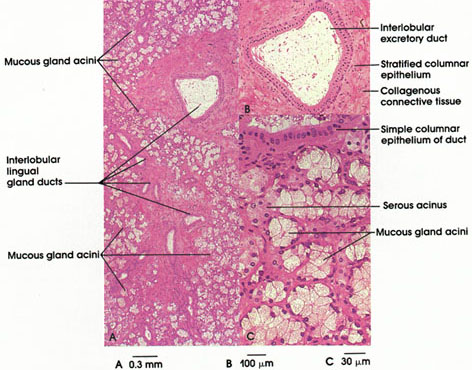

Plate 10.212 Sublingual Gland
Ronald A. Bergman, Ph.D., Adel K. Afifi, M.D., Paul M. Heidger,
Jr., Ph.D.
Peer Review Status: Externally Peer Reviewed

Rhesus monkey, glutaraidehyde fixation, H. & E.,
A. 28 x; B. 55 x; C. 222 x.
The sublingual gland is a branched tubuloacinar gland and is a mixed gland composed predominantly of mucous acini. The gland also contains a variable number of acini containing serous cells and serous demilunes in different parts of the gland. The mucous gland cell secretes viscid mucigen, which is rich in sulfated polysaccharide. The serous cells secrete a watery product rich in sulfated glycoproteins.
Note the large duct with its stratified columnar epithelium and other smaller ducts with a simple columnar epithelium.
Characteristically the mucous gland cells have a poorly staining apical cytoplasm, and the nuclei are heterochromatic and flattened against the basal cell membrane.
Next Page | Previous Page | Section Top | Title Page
Please send us comments by filling out our Comment Form.
All contents copyright © 1995-2025 the Author(s) and Michael P. D'Alessandro, M.D. All rights reserved.
"Anatomy Atlases", the Anatomy Atlases logo, and "A digital library of anatomy information" are all Trademarks of Michael P. D'Alessandro, M.D.
Anatomy Atlases is funded in whole by Michael P. D'Alessandro, M.D. Advertising is not accepted.
Your personal information remains confidential and is not sold, leased, or given to any third party be they reliable or not.
The information contained in Anatomy Atlases is not a substitute for the medical care and advice of your physician. There may be variations in treatment that your physician may recommend based on individual facts and circumstances.
URL: http://www.anatomyatlases.org/